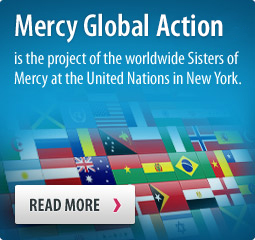
Angela Reed rsm Attends the 5th Thematic Session on Migration in Vienna, Austria
Reports: October 01, 2017
The 5th intergovernmental session working towards the 2018 Global Compact on Migration took place at UN Vienna on 4-5 September 2017. The focus of the two day session was smuggling and trafficking of migrants. Numerous NGOs and faith based organizations, including MIA at the UN, participated in the sessions.
The issues brief highlighted that in the absence of regular migration pathways, many migrants are subject to often perilous journeys and forced to engage a smuggler whilst seeking peace and safety. This can also result in migrants being trafficked.
Reaffirming the New York Declaration, the issues brief highlights the importance of existing international instruments on preventing and combating trafficking in persons and smuggling of persons; two distinct but often interrelated problems. The brief also draws attention to the abuse and exploitation that many migrants face and calls for identification and support of victims of trafficking.
Over the two days, three panels explored particular issues related to the brief.
- Panel 1 – Smuggling of Migrants
- Panel 2 – Trafficking in persons and contemporary forms of slavery
- Panel 3 – Appropriate Identification, protection, assistance to migrants and trafficking victims
Consisting of experts in the field, academics and long term policy advocates, the panelists provided information and perspectives that challenged often long held myths about smuggling, smugglers, traffickers and those experiencing trafficking. Key to the ongoing dialogue was an understanding of the nexus between trafficking and smuggling. Significantly, there was a strong call for better information and inter linkages about both phenomena, whilst at the same time recognizing the need to differentiate between the two.
Several member state delegations in responding to the panels called for a holistic response to the issue, with respect to human rights and attention to the 2030 agenda. Many maintained that migrants who are smuggled should not be criminalized and that there is a need to address the root causes of migration. Some States underlined the right to manage their borders and migration flows. This was often accompanied by a discussion on the need to realize the rights and protect the lives of migrants.
In the final session, thematic expert, Ms Joy Ngozi Ezeilo provided a synopsis of the main conclusions and outcomes. Key points made by Ms Ngozi Ezeilo included:
- The two crimes whilst distinct, often overlap
- States have a sovereign right to manage entry into their country but must respect human rights and international law
- We need more data to better understand the how and who is involved in both people smuggling and human trafficking
- Trafficking prosecutions remain very low, while the number of trafficking victims is high
- There must be a commitment to victim centered approaches
- We must confront the demand for goods produced through exploitation
- Using the term ‘modern slavery’ may detract from what we have enshrined in law i.e. human trafficking
- All policy actions must be guided by the international legal framework
- There is a need to look at how exploitation is an outcome of existing economic models
- State anti-trafficking policies must not impinge on the human rights of victims
- There should be more opportunities for safe migration
Finally, Ms Joy Ngozi Ezelo encouraged all stakeholders to be clear in their absolute rejection of exploitation in migration.
Statements from the floor including member states and other stakeholders can be accessed here.
Messages to: Angela Reed rsm - MIA Coordinator at the UN - Mercy Global Action




